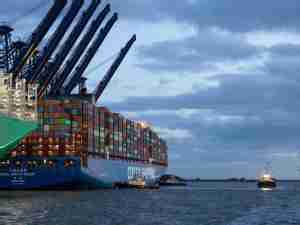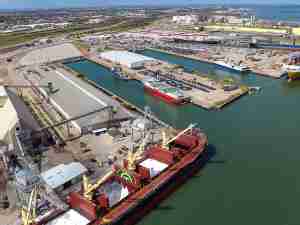Ethanol
Ethanol throughput was 50% up on 2007, at 2.4 million tons. By far the lion’s share - 1.7 million tons (+0.6 million tons) - related to incoming trade. As the markets for chemical products and drink have not increased much, its use as fuel (“fuel ethanol”) was probably the driving factor here.
In 2008, Brazil was again the most important source country and it managed to increase its share from 40 to 50%. Growth was particularly marked from September 2008 onwards, with monthly imports in excess of 100,000 tons. Parallel to this, the size of the consignments per tanker is increasing: 25,000 tons is increasingly common and over 45,000 tons has even been recorded. France came a good second as source country, with a share of over 15%. In addition to Brazil, incoming trade from other Latin American countries, such as Argentina, Costa Rica, Venezuela, Peru and Guatemala remained important.
Outgoing trade rose from 0.4 to 0.7 million tons. The main overseas destinations were Sweden (over 30%) and Finland and the United Kingdom, both with a little over 10%. For close on 60,000 tons of the outgoing trade, no country of destination was recorded. The great majority involved Brazilian ethanol, which was transferred in Rotterdam into coastal tankers. This is done both directly ship to ship and via interim storage at the independent terminals.
Biodiesel
For biodiesel, throughput figures more than doubled: from 1.2 to 2.7 million tons, two thirds of which was incoming trade. The driving factor was the B99 (99% biodiesel and maximum 1% mineral) from the United States. Subsidies there made this product more than $200 per tonne cheaper than European biodiesel. Imports of biodiesel from the US were around 1 million tons. In the meantime, the European Commission has proposed import levies to counter the dumping of B99. Other larger source countries are the United Kingdom and Germany, both with more than 100,000 tons. Imports from Malaysia are increasing. The trend is towards the globalisation of biodiesel production and transport: the number of source countries doubled to over twenty.
Much of the biodiesel from the US was exported again via Rotterdam. More than 40% of the outgoing trade went to the United Kingdom. Spain, France, Germany and Italy all received around 50,000 tons.
Transit and production
The logistic flows are growing and the number of source and destination countries has more than doubled in the space of two years, to twenty. In addition to this, a production facility with a capacity in excess of three million tons is under construction in Rotterdam itself and is already partially operational. In this way, a large flexible market is emerging. Here, the buyers, such as the big oil companies who have to mix in biofuel, can easily combine long-term basic contracts with spot contracts. The Port Authority therefore expects a further increase in the intra-European transport of biofuels, reinforced by EU levies on the import of B99 from the US.
Throughput since 2002
(in metric tons, 2003 and 2004 not available)
| Ethanol | Biodiesel | |
| 2002 | 200,000 | - |
| 1,100,000 | < 50,000 | |
| 2006 | 1,100,000
More Ports & Terminals
Mi-Jack Products partners with Terberg Taylor Americas for PDS-ready yard and terminal tractorsView Article_-_28de80_-_939128c573a41e7660e286f3686f2a6e25686350_yes.jpg)
Skanska awarded contract to develop offshore wind port at South Brooklyn Marine TerminalView ArticlePort of Oakland air quality initiatives supported by $4 million federal grantFunding for electric trucks, electric sweeper and electric vehicle chargers View Article
Maersk unit worth more than $1 billion set to trade in spinoffView Article
CBP officers continue recovering stolen vehicles at Charleston and Savannah seaportsView Article
Galveston Wharves board approves $29 million construction contract for cargo areaView Article© Copyright 1999–2024 American Journal of Transportation. All Rights Reserved |





